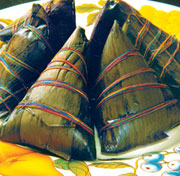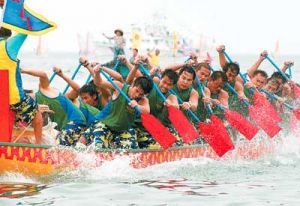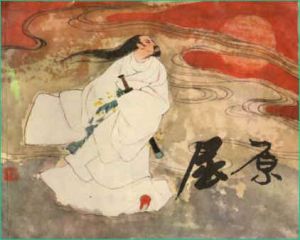端午节的传统
The Duanwu Festival falls on the fifth day of the fifth month of the Chinese lunar calendar. For thousands of years, Duanwu has been marked(纪念)by eating Zongzi and racing dragon boats.
The taste of Zongzi, a pyramid-shaped (金字塔形状) dumpling made of glutinous rice (糯米) and wrapped in bamboo or reed leaves (竹子或芦苇叶) to give it a special flavor(味道), varies (不同)greatly across China. Zongzi is often made of rice mixed with dates in Northern China, because dates are abundant (充足) in the area. Eastern China’s Jiaxing County is famous for its pork-stuffed Zongzi(猪肉粽子). In the southern province of Guangdong, people stuff(填充) Zongzi with pork, ham, chestnuts and other ingredients成分), making them very rich in flavor. In Sichuan province, Zongzi is usually served with a sugar dressing. Most people still maintain (保持) the tradition of eating Zongzi on the day of the Duanwu Festival. But the special delicacy (佳肴) has become so popular that you can now buy it all the year round.
Duanwu is also known as the Dragon Boat Festival, because dragon boat races are the most popular activity during the festival, especially in Southern China. A dragon boat is shaped like a dragon, and is brightly painted in red, white, yellow and black. Usually, a dragon boat is 20 to 40 meters long, and needs several dozen people to row it. Boatmen row the boat in cadence (节奏) with the drumbeats (鼓声), as the captain standing in the bow of the boat waves a small flag to help coordinate(协调) the rowing. Before the race gets underway, a solemn ceremony (庄严的仪式) is held to worship the Dragon King.
Dragon boat racing is quite a spectacle (奇观、景象), with drums beating, colorful flags waving, and thousands of people cheering on both sides of the river. Nowadays, it has become a popular sporting activity in Southern China. International dragon boat races are held in Guangzhou and Hong Kong every year.
The Duanwu Festival used to have other interesting customs that are no longer commonly observed, though you may still find them practiced in some rural areas.
Ancient Chinese believed the day of Duanwu was unlucky because midsummer was just around the corner. The hot weather used to bring various diseases, which could spread rampantly(猖獗地). Dispelling disease (祛病)and driving out evil (恶魔) were the main purpose of the festival. People would paste on their front doors pictures of Zhongkui, a legendary Chinese ghost-catcher(捉鬼人). People would also use cattail(香薄) and mugwort leaves (艾叶)to drive away mosquitoes (蚊子)and other insects.
Since children are generally the most vulnerable(易受攻击) to disease, they received extra care at this special time. Children would wear necklaces or bracelets, made of red, yellow, blue, white and black threads, to keep evil away from them. They would also receive colorful pouches (袋) containing fragrant herbal medicines (香料) as presents. They hung these around their necks, and would compete with one another to see whose pouch had the finest needlework. Mothers also made sure to bathe their children in water boiled with herbal medicines. Modern science has proven that these medicines are, in fact, quite beneficial to health.
Ancient Chinese believed realgar(雄黄) was an antidote(解毒剂) for all poisons, and therefore most effective to drive away evil spirits and kill insects. So everyone would drink some realgar wine during the Duanwu Festival, and children would have the Chinese character for “King” written on their foreheads with realgar wine.
For thousands of years, the tradition of the Duanwu Festival has been passed down from one generation to the next. But where did it come from and why did people eat Zongzi and race dragon boats? Many scholars (学者)have studied these questions and given their academic explanations.
One explanation is that the Duanwu Festival originated from people’s worship of dragons. In ancient China, people believed the dragon was the god in charge of water, which was very important to daily life and agricultural production(农业生产). On the day of Duanwu, people raced dragon boats to entertain (招待、款待)the god and offered him Zongzi as a treat. The only purpose was to please the god to ensure (保证) a year of favorable weather.
Some people believe Duanwu comes from activities instigated(鼓动) by ancient sorcerers(巫师). These activities were held in early summer when the hot weather was about to bring diseases to people who didn’t have modern devices (设备) and medicines to protect themselves. So, ancient sorcerers encouraged people to wear fragrant pouches(香包) and hang mugwort and calamus (calamus 菖蒲, 羽根)on their doors to drive away the so-called evil spirits that caused diseases.
Scholars may provide many other explanations about the origin of the Duanwu Festival. But if you ask ordinary people about its origin, you’ll get the same answer. They will tell you that the Duanwu Festival honors the great poet, Qu Yuan. They’ll also tell you the story that has been passed down for more than 2,000 years.
Qu Yuan was born in 340 BC, during the Warring States Period (战国时期). At that time, there were seven states struggling among themselves to unify China. Of the seven states, Qin was the strongest and Chu the largest.
Qu Yuan was a noble of Chu. During his lifetime, the powerful kingdom of Chu fell into a decline(衰落).
Early in his life, Qu Yuan won the confidence of the King of Chu, and was his deputy prime minister, helping draft(起草) laws and determine foreign policy. When he saw the danger posed by the ambitious (野心的) Qin State, he proposed government reforms (改革) and an alliance (联合)with the neighboring Qi state as a way to ensure Chu’s safety.
But the King of Chu was surrounded by self-seekers (只顾自己的人), who were jealous of (嫉妒)Qu Yuan. They accepted bribes(贿赂) from the Qin’s envoy(使节), dissuaded (劝阻) the King from taking Qu Yuan’s advice and brought about the poet’s estrangement(疏远) from the King. Qu Yuan was finally sent into exile (流放) for 20 years.
During those desperate(绝望) years, Qu Yuan helplessly watched his beloved country become weaker every day. In the year 278 BC, the capital of Chu was stormed by troops from Qin. In great pain, Qu Yuan wrote “Lisao” or “The Lament(悼词,挽诗)”, the greatest of all his poems. On the fifth day of the fifth lunar month(农历五月五日), he drowned(溺死) himself in the Milo River, because he was hopeless about his country’s future.
Qu Yuan died thousands of years ago, but he is remembered every year for his love of and loyalty (忠实)to his country and his people. In his poems, he wrote:
Long did I sigh and wipe away my tears,
To see my people bowed by grieves and fears.
......
The people’s sufferings move my heart,
Our land I cannot leave.
People grieve (哀悼)for those who have grieved for them. Each year, during the Duanwu Festival, the day of Qu Yuan’s death, people race dragon boats to commemorate (纪念) him. This is believed to be a representation(表现) of how the people of Chu tried, at the time, to recover Qu Yuan’s body from the Milo River. Pyramid-shaped dumplings by the name of Zongzi were thrown in the river to feed the fish, so they would stay away from Qu Yuan’s body.
Qu Yuan’s life was tragic(悲剧) but, as a poet, he achieved great success. In fact, he is considered to be the first poet in Chinese literature. Before his time, there were only folk songs. Qu Yuan created a new style of poetry, which became known as Chu Ci.
附件列表
词条内容仅供参考,如果您需要解决具体问题
(尤其在法律、医学等领域),建议您咨询相关领域专业人士。
如果您认为本词条还有待完善,请 编辑
上一篇 美国五大最搞怪的节日 下一篇 新三国经典台词英文版



